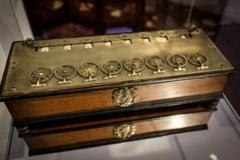Will the Paris Court Halt the Auction of History's Oldest Calculator?

Published: 2025-11-20 03:00:15 | Category: world
The planned auction of La Pascaline, one of the world's first calculating machines, has been halted by a Paris court, which provisionally blocked its export due to its significant historical value. Developed by the renowned French mathematician Blaise Pascal in 1642, La Pascaline was expected to fetch between €2 to €3 million (£1.77 million to £2.65 million) at Christie's auction, labelled the "most important scientific instrument ever offered at auction". The court's ruling underscores the machine's potential classification as a "national treasure", which could ensure its preservation in France.
Last updated: 24 October 2023 (BST)
What’s happening now
The Paris administrative court's recent decision has temporarily blocked the sale of La Pascaline, reflecting the growing concern over the export of culturally significant artefacts. This ruling comes after a legal appeal from scientists and heritage advocates who argue that the machine should be protected under France's heritage laws. Christie's has confirmed that, in line with the court's directive, the auction of this historic item will not proceed until further notice. The court's judgment highlights the increasing scrutiny of cultural heritage in the face of commercial interests.
Key takeaways
- The auction of La Pascaline has been provisionally blocked by a Paris court.
- La Pascaline is one of only nine existing models of the early calculating machine.
- The court's ruling raises questions about the protection of national treasures in France.
Timeline: how we got here
Here’s a brief timeline of events leading to the current situation regarding La Pascaline:
- 1642: Blaise Pascal develops La Pascaline, an early mechanical calculator.
- May 2023: France's culture minister grants an export authorisation for La Pascaline.
- October 2023: A Paris administrative court blocks the export of La Pascaline, raising doubts about the legality of the previous certificate.
What’s new vs what’s known
New today/this week
The Paris court's ruling is the latest development in the ongoing debate about the cultural significance of La Pascaline. The provisional measure highlights the court's recognition of the machine's potential status as a national treasure, which could lead to long-term protections against export.
What was already established
Prior to this court ruling, La Pascaline was set to be auctioned off by Christie's, with expectations of reaching a significant sale price. The historical importance of the machine had been well-documented, with Christie's describing it as a major leap in scientific instrumentation.
Impact for the UK
Consumers and households
While the immediate impact of the court's decision is primarily felt in France, UK collectors and institutions that value historical artefacts may be concerned about similar measures potentially affecting the international art market. The preservation of such items can influence how cultural heritage is approached across borders.
Businesses and jobs
The auction market could face a ripple effect from this decision, as it raises questions about the sale of significant historical items. Auction houses in the UK might need to reassess similar items’ export statuses, which could affect their operations and revenue from high-value sales.
Policy and regulation
This incident may prompt discussions within the UK about the need for more robust protections for culturally significant items. As heritage laws evolve, businesses dealing in art and antiques may need to adapt to new regulations that could arise from the lessons learned in this case.
Numbers that matter
- €2–3 million (£1.77 million to £2.65 million): Estimated auction price for La Pascaline.
- Nine: The total number of existing La Pascaline machines worldwide.
- 1642: The year La Pascaline was invented by Blaise Pascal.
Definitions and jargon buster
- La Pascaline: An early mechanical calculator developed by Blaise Pascal.
- National treasure: A designation for items of significant cultural, historical, or artistic value, often protected by law.
- Cultural heritage: The legacy of physical artefacts and intangible attributes of a group or society inherited from past generations.
How to think about the next steps
Near term (0–4 weeks)
In the immediate future, Christie's will likely await further legal developments regarding the court's provisional ruling. The auction house may also engage in discussions with French authorities to clarify the status of La Pascaline.
Medium term (1–6 months)
Over the next few months, the outcome of the legal proceedings will be pivotal. If the court ultimately classifies La Pascaline as a national treasure, it could lead to permanent protection and restrictions on its export.
Signals to watch
- The final judgment from the Paris administrative court regarding La Pascaline’s export status.
- Potential changes in French heritage laws that could arise from this case.
- Reactions from the international auction community regarding the implications for similar items.
Practical guidance
Do
- Stay informed about the legal developments surrounding La Pascaline and similar artefacts.
- Consider the implications of heritage protections on future art and auction markets.
Don’t
- Don’t dismiss the potential for changes in regulations that could affect both collectors and auction houses.
- Don’t overlook the importance of cultural heritage in the valuation of historical items.
Checklist
- Review auction items for potential heritage designations.
- Engage with legal experts on cultural property rights.
- Monitor similar cases in other countries for emerging trends.
Risks, caveats, and uncertainties
As the situation develops, various uncertainties remain. The outcome of the legal proceedings could change, potentially leading to different interpretations of what constitutes a national treasure. Furthermore, the implications of this case may influence future regulations concerning cultural heritage, both in France and internationally, making it essential to stay updated on legal and market developments.
Bottom line
The provisional blocking of La Pascaline's auction is a significant moment in the ongoing dialogue about cultural heritage and its protection. For UK collectors and institutions, this serves as a reminder of the importance of understanding the legal landscape surrounding historical artefacts. With the potential for changes in regulations, it is crucial to remain vigilant and informed about developments in this area.
FAQs
What is La Pascaline?
La Pascaline is one of the world's first calculating machines, developed by Blaise Pascal in 1642. It represents a significant advancement in early computing technology.
Why was the auction of La Pascaline cancelled?
The auction was cancelled due to a provisional court ruling that blocked its export, questioning the legality of the prior export authorisation based on its historical significance.
What are the implications of this ruling for cultural heritage in France?
This ruling may set a precedent for future protections of culturally significant items in France, potentially influencing how similar artefacts are treated under heritage laws.


